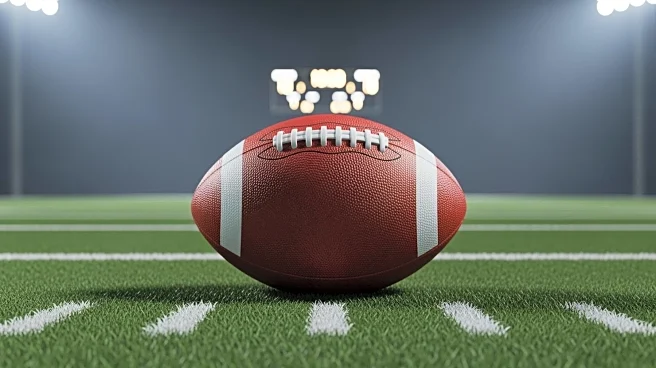What's Happening?
Notre Dame Football recently faced off against the Pittsburgh Panthers, with various analyses and predictions made about the game. The team finished the game with zero penalties, which was unexpected.
Discussions around the impact of Name, Image, and Likeness (NIL) agreements were highlighted, suggesting increased parity in college football. Aneyas Williams was noted for his impressive performance in limited action, earning more touches in future games. Malachi Fields was predicted to exceed 100 yards, but fell short due to a drop. The aggressive play style of Pittsburgh's safeties was expected to challenge Notre Dame's offensive strategy. Tae Johnson, a freshman All-American, was anticipated to make two interceptions due to his impressive range and instincts, exploiting Pittsburgh's quarterback Mason Heintschel's inexperience.
Why It's Important?
The analysis of Notre Dame's performance against Pittsburgh highlights the evolving dynamics in college football, particularly with the introduction of NIL agreements. These agreements are believed to level the playing field, allowing more teams to compete effectively by compensating players. The focus on individual player performances, such as Aneyas Williams and Tae Johnson, underscores the importance of talent development and strategic gameplay in achieving success. The predictions and outcomes of the game provide insights into team strategies and player capabilities, influencing future matchups and coaching decisions. The game serves as a reflection of broader trends in college sports, where financial incentives and player development are increasingly pivotal.
What's Next?
Notre Dame will likely continue to refine its strategies, focusing on maximizing player strengths and addressing areas of improvement identified in the game against Pittsburgh. The team may adjust its offensive and defensive tactics to better counter aggressive opponents like Pittsburgh. Players such as Malachi Fields and Tae Johnson are expected to play key roles in upcoming games, with coaches potentially increasing their involvement based on recent performances. The impact of NIL agreements will continue to be monitored, as they influence recruitment and team dynamics across college football. Notre Dame's future games will be crucial in determining their standing and competitiveness in the league.
Beyond the Headlines
The introduction of NIL agreements in college sports represents a significant shift in the traditional model, potentially altering recruitment strategies and team compositions. This change raises ethical and legal questions about the commercialization of college athletics and its impact on student-athletes. The focus on individual player achievements and strategic gameplay highlights the increasing importance of analytics and data-driven decision-making in sports. As teams adapt to these changes, the long-term implications for college football could include increased competition, shifts in power dynamics, and evolving fan engagement.










